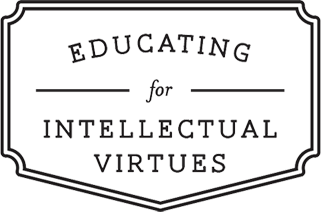
Resources
To learn more about the nature of intellectual virtues and their importance to the aims of education education, check out the resources below. For more on the practical dimensions of educating for intellectual virtues, see here.
Books by philosophers
Jason Baehr, Deep in Thought: A Practical Guide to Teaching for Intellectual Virtues (2021). This is the most comprehensive and up-to-date treatment of the “principles, postures, and practices” involved with teaching for intellectual virtues. The first several chapters offer an account of the nature of intellectual virtues and importance as an educational aim.
Jason Baehr, Deep in Thought: A Practical Guide to Teaching for Intellectual Virtues (2021). This is the most comprehensive and up-to-date treatment of the “principles, postures, and practices” involved with teaching for intellectual virtues. The first several chapters offer an account of the nature of intellectual virtues and importance as an educational aim.
Jason Baehr, ed., Intellectual Virtues and Education: Essays in Applied Virtue Epistemology (2016). This book contains essays by leading virtue epistemologists and philosophers of education that address questions like: Which intellectual virtues are most important to education? How is growth in intellectual virtues related to other important educational goals? What does it look like to educate for intellectual virtues?
Robert Roberts and Jay Wood, Intellectual Virtues: An Essay in Regulative Epistemology (2007). Chapters 6-12 of this book offer rich philosophical “profiles” of several key virtues, for example, love of knowledge (Ch. 6), courage and caution (Ch. 8), humility (Ch. 9), and autonomy (Ch. 10).
Heather Battaly, Virtue (2015). This is an accessible introduction to the concept of virtue that addresses both intellectual virtues and moral virtues. Chapter 1 addresses the nature of a virtue, Chapter 4 is an interesting discussion of the nature of vices, and Chapter 7 offers an account of how virtues are acquired.
Jason Baehr, The Inquiring Mind: On Intellectual Virtues and Virtue Epistemology (2011). Chapters 6-7 develop a theory of intellectual virtue and Chapters 8 and 9 provide detailed accounts of two individual virtues: open-mindedness (Ch. 8) and intellect courage (Ch. 9).
Hugh Sockett, Knowledge and Virtue in Teaching and Learning: The Primacy of Dispositions (2012). This book argues that the development of intellectual and moral dispositions is no less central to education than the teaching of content. It contains extended discussions of virtues like truthfulness (Ch. 4), open-mindedness (Ch. 5), impartiality (Ch. 6), and intellectual courage (Ch. 8). It also contains resources related to professional development and teacher assessment (Chs. 10-12). As such, it is suitable for scholars and practitioners alike.
Kristján Kristjánsson, Aristotelian Character Education (2015). While focusing mostly on traditional or moral character education, this book develops and defends an overall theoretical framework (inspired by Aristotle’s moral theory) most of which applies with equal force to intellectual character education. In addition to addressing several important theoretical issues and challenges, several chapters (e.g. Chs. 6 and 7) also address important issues related to the practice of fostering good character in an educational setting.

Books by psychologists and educational theorists
Ron Ritchhart, Intellectual Character: What It is, Why It Matters, and How to Get It (2002). Chapters 1-3 provide an accessible, psychologically-informed account of the nature and value of intellectual character and “thinking dispositions” (Ritchhart’s term for intellectual virtues).
Richard Paul and Linda Elder, Critical Thinking: Tools for Taking Charge of Your Personal and Professional Life (2013). Chapters 3 and 4 address several intellectual virtues central to critical thinking, for example, intellectual courage, intellectual empathy, and intellectual humility.
Arthur Costa and Bena Kallick, Learning and Leading with Habits of Mind (2008). Part I of the book (Chs. 1-5) address the nature and educational importance of “habits of mind” (i.e. intellectual virtues).
Larry P. Nucci and Darcia Narvaez (eds.), Handbook of Moral and Character Education (2008). Written for researchers and scholars in social development and traditional character education, the 30 chapters in this volume address a wide range of theoretical issues important to educating for good character (including good intellectual character).
Nancy Snow (ed.), Cultivating Virtue: Perspectives from Philosophy, Theology, and Psychology (2015). Collecting essays from leading philosophers, theologians, and psychologists, this volume addresses a diverse range of perspectives on the enterprise of fostering virtues. While not focused on intellectual virtues in particular, many of the chapters are useful for understanding the substance and value of intellectual character education.
Books by education writers
Phil Dow, Virtuous Minds (2013). Chapters 1-7 consist of brief, engaging treatments of seven intellectual virtues: intellectual courage, intellectual carefulness, intellectual tenacity, intellectual fair-mindedness, intellectual curiosity, intellectual honesty, and intellectual humility. While written for a broadly religious audience, these chapters have wide relevance and appeal.
Paul Tough, How Children Succeed (2012). Provides a valuable overview of research that establishes a correlation between certain intellectual virtues (or “noncognitive skills”) and success inside and outside of the classroom.

Articles
Shari Tishman, “Why Teach Habits of Mind.” A nice overview of what intellectual virtues are and why teaching should foster them.
Jason Baehr, “Educating for Intellectual Virtues: From Theory to Practice.” Provides an overview of what intellectual virtues are, why they matter to education, and what it looks like to educate for growth in intellectual virtues.
Ron Ritchhart, “From IQ to IC: A Dispositional View of Intelligence.” Argues that intelligence should be understood in terms of intellectual character rather than innate cognitive ability.
David Perkins and Ron Ritchhart, “Life in the Mindful Classroom.” Argues that “mindfulness,” understood as an intellectual character trait, is a central educational goal and discusses strategies for fostering mindfulness in the classroom.
Shari Tishman, Eileen Jay, and David Perkins, “Teaching Thinking Dispositions: From Enculturation to Transmission.” Identifies seven core “thinking dispositions” (i.e. intellectual virtues) and examines how they can be “enculturated” in a school setting.
Marvin Berkowitz and Melinda Bier, “What Works In Character Education.” Written for education researchers, this article reports on a study of 33 effective character education programs and identifies the shared practices of these programs.
Further resources
Blog posts on nine key virtues. As part of a series of posts for the Intellectual Virtues Academy blog, Dr. Jason Baehr offers brief essays on the school’s nine “master virtues”: curiosity, intellectual autonomy, intellectual humility, attentiveness, intellectual carefulness, intellectual thoroughness, open-mindedness, intellectual courage, and intellectual tenacity.
“Links Between Intellectual Virtues, Intellectual Character Education, and Academic Performance.” This document, submitted to the John Templeton Foundation as part of a grant application in 2015, provides an informal overview of some of the academic research pertaining to intellectual character development and academic performance.
See here for a bibliography of additional books and articles related to educating for intellectual virtues.


